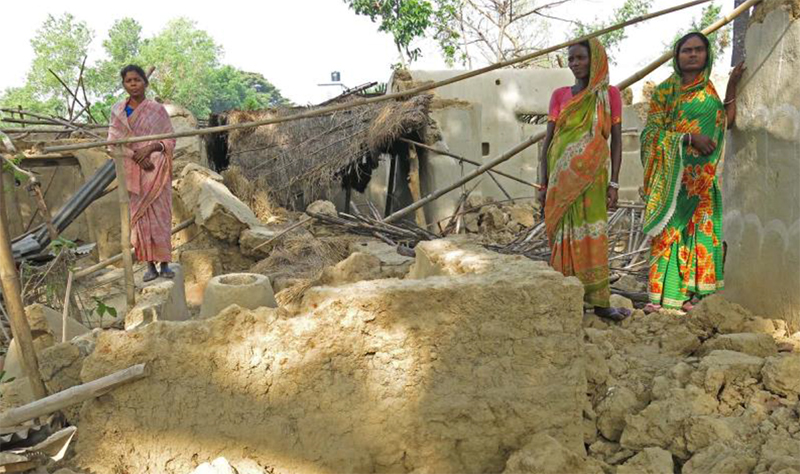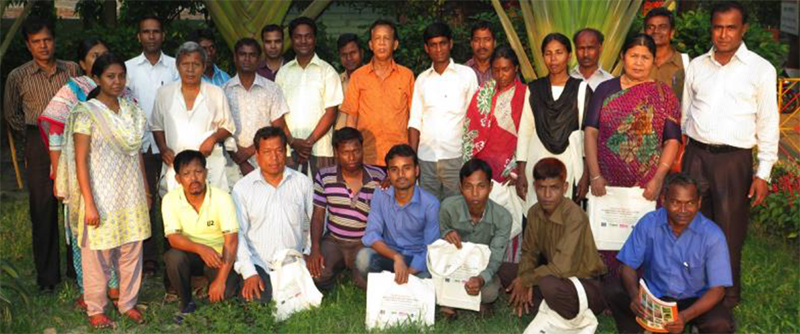
Our Forgotten Communities
The state, through its recent law, Khudra Nri-gosthi Sangskritik Pratisthan Ain, 2010 (Small Ethnic Group Cultural Institution Act, 2010) recognizes 27 ‘ethnic’ groups in Bangladesh. However, fresh inventories and review of existing literature summarized and presented by Philip Gain, director of SEHD and lead researcher of the initiative to map the ethnic communities show that there are as many as 50 such communities in the northwest, north-center and the tea gardens of Bangladesh who remain unrecognized, isolated and invisible both constitutionally and statistically.
The little-known ethnic groups in the North-center and Northwest that remain largely invisible are Bagdi, Banai, Bhuiya, Bhuimali, Bhumij, Bindu, Chowhan, Ghatual or Ghatuar, Ganju or Singh, Gorait, Hajra, Hari, Hodi, Kadar, Kairi, Kalwar, Rai Barman (Khastryio), Koda, Kora, Karmakar, Kurmi, Madak, Mahali/Mahle, Malo, Mushohor, Nunia, Pahan, Pal Teli, Robidas, Rajbhor, Rajuar, Singh, Tanti, Telegu, Teli, and Turi among others.Some of these communities are found in the tea gardens. In addition, there are also more than 70 communities in the tea gardens. These are indeed some of the most marginalized and excluded groups of people and ‘captive’ laborers in the tea garden of Bangladesh.
“These communities are faced with severe deprivation. To bring change in their lives, the state and the people of the majority community should feel their deprivation from heart,” said Lukas Kispotta, an Oraon intellect of Dinajpur. “These communities deserve special attention because they offer incredible diversity and value to this nation. The state must adopt right policies to protect these communities.”
To elaborate the issue of deprivation that Lukas Kispotta raised, Bichitra Tirki (34), an Oraon from Rajshahi, sheds her tear as she talks about oppression her Bengali neighbors inflicted on her. In her struggle to protect the family land, she has been severely assaulted—both physically and mentally. Bichitra’s husband Mongla beset by a gang of land grabbers who took control of all his 48 bighas of land (33 decimals is one bigha) died in 1999. The family related the death to shock that Mongla went through for physical attack and mental torture his Bengali neighbors caused to him.
Bichitra fought in the court and conclusively recovered 26 bighas of the family land in 2007 and was hoping to recover the rest 22 bighas that remained under injunction. It was at such stage that last year the land grabbers attacked Bichitra and her family right on their land. They beat her severely, tore her clothes, completely undressed and allegedly raped her.
“We, the adivasis, are repressed non-stop. But the state does not protect us,” accuses Bichitra. “The biggest trouble we face today is attack on our land. The land grabbers are unsettling our life with false cases. We do not get speedy trial and justice in the court. We make equal contribution with our Bengali brethren in building the nation but we are not treated as equal citizens.”
With agony in heart Bichitra Tirki puts a question to the state: “Shall we leave this country? Does the state want to drive us out?”
Dr. Tanzimuddin Khan, associate professor of international relations of Dhaka University reflects on the character of the state and psyche of the majority Bengali for the inhospitable treatment towards the ethnic communities that are frequently reported. “It is for severe criminalizationof the state that it is no more humane. That the state does not want to ratify Indigenous and Tribal Peoples Convention 169 reflects its inhumane structure,” said Khan. “The state instead of ensuring equal treatment to all of its citizens, is contributing to further marginalization of the ethnic and excluded communities.”
The current character of the state towards these communities also involves the members of the majority the community “who do not help in the making of state character that is caring towards the minorities and communities in exclusion and helplessness,” added Khan.”It is time for all of us to think about the character of the state and how the state becomes humane and pay special attention to its national minorities and excluded communities.”
It is not just the land-related and social issues that cause despair to the ethnic communities, particularly the little-known ones, there are serious concerns about their languages and cultures. Aside from Bangla, there are some 37 languages spoken by ethnic communities of Bangladesh (according to Justice Habibur Rahman, 2014 in Bangladesher Nanan Bhasha–Different Languages of Bangladesh). The number of languages spoken may increase if proper census is done. There are communities who no more speak their languages and there are others who speak their languages but do not have alphabets. “There are threats of languages spoken by the ethnic communities getting lost. It is important to nurture and preserve alphabets,” said Abu Raihan Miah, ADC General of Dinajpur district. “The adivasi youth need to train themselves on how to protect languages. Many languages spoken today may get lost in the future.”
“The adivasis are losing much of their tradition, knowledge, festivals and glories of the past,” warned Moazzen Hossain of Gram Bikash Kendra (GBK), a Dinajpur based development organization close to ethnic communities and Dalits. “This is a loss not only of the adivasis but also for the nation as well.”
Resolving Land-related Issues
While problems dominated most part of the dialogue, speakers also talked about solution. Abdullah Sarker, Prothom AlocorrespondentDinajpur who has been reporting on adivasi issues urged the NGOs, church bodies and the adivasi organizations to assist the advasis to secure their land title papers. “One big reason for eviction and violence against the adivasis is that their land title papers are not up-to-date.”
ADC General Abu Raihan Miah concurred with Abdullah Sarker. “For solution of land-related problems you need to carefully find out what amount of land you have in your name, have a clear idea of the boundary of your land, check the record, kharij the name and then secure the title,” advised the ADC General who adds, “Adivasis have the same rights like all other citizens of the country. There are criminals around you should stay watchful about.”
Advocate Babul Robidas adds: “The current law, especially East Bengal State Acquisition and Tenancy Act (EBSATA) provides safeguard to the adivasi land. The adivasis should know and make use of this law.”
“The adivasis should also resolve their internal conflicts,” suggested Moazzem Hossain, “and work towards having a permanent land commission.”
Rabindranath Soren, the chair at the dialogue and president of Jatiyo Adivasi Parishad (JAP)appreciated the role of women in struggle for rights. “On the one hand,the adivasi women face oppression and on the other, they stay in the frontline of resistance movement for rights.”
PDF version of report [ Download ]
Report by Philip Gain
The writer is director of Society for Environment and Human Development (SEHD)
First Published: Dhaka Courier, 30 April 2015

